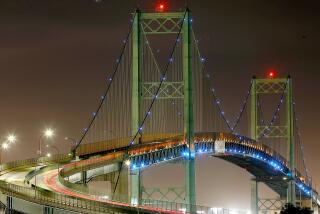Freeway Safety Before Profits
Caltrans Director Jose Medina came to his assignment a year ago from his post as a San Francisco supervisor with little direct transportation experience. Now the possible bartering away of public safety on the Riverside Freeway raises the question of why he is in the job at all.
Medina agreed last fall to delay needed safety improvements on the freeway to satisfy the operator of a private tollway who was worried about competition. Legislators in Sacramento ought to have plenty to ask at next week’s hearing on why the safety improvements were rejected.
Freeway accidents have increased as much as 124% since the 10-mile-long private toll road opened on the median strip of the 91 Freeway in 1995, according to internal agency documents. Yet Medina agreed to shelve freeway improvements that would have addressed both dangerous weaving across lanes near a tollway entrance and accidents occurring nearby on the freeway. The canceled safety improvements had been under development for more than two years and would have added two westbound lanes and one eastbound lane on the freeway.
To justify postponing improvements, Caltrans cited an agreement not to compete with the toll road for business. The decision was instrumental in settling a $100-million lawsuit filed by the private operators, California Private Transportation Co., to block the freeway work. The company had in mind a sale of the toll lanes and was concerned about the effect lower revenue would have on investors.
For a Caltrans director, nothing should trump public safety. Questions have now been raised about the accuracy of lower-level reports on the severity of the Riverside Freeway problems. However, if there was doubt about any of this, Medina could have brought higher-ups into his decision-making, as his predecessor did on matters related to the novel 91 Express Lanes. Medina apparently went ahead with this critical decision without consulting his bosses, including the governor and the secretary of transportation.
What kind of logic would lead to a determination that a private business’ number-crunching should take priority over being certain of protecting the motoring public? Why were local officials kept uninformed about the legal settlement and the sale negotiations at the insistence of the operators? Why were the pleas of officials in Orange and Riverside counties for the safety improvements ignored? Finally, to whom does a Caltrans director owe primary allegiance, the public or a private business?
When private toll roads first were proposed as a way to get new roads built in California, there were questions about who would look out for the public as operators sought to make their ventures profitable. The concessions that Caltrans now appears to have made during the operation of this toll road are big enough to drive an 18-wheel rig through.
The Legislature should demand better oversight for any such projects in the future--and better overseers.
More to Read
Sign up for Essential California
The most important California stories and recommendations in your inbox every morning.
You may occasionally receive promotional content from the Los Angeles Times.










